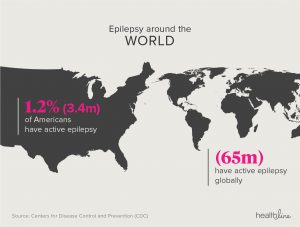Epilepsy is a nonchronic disease of the brain which affects people of all age.
Key facts about Epilepsy:
- Nearly 80% of people with epilepsy live in low- and middle-income countries.
- It is estimated that 70% of people living with epilepsy could live seizure-free if properly diagnosed and treated.
- About three-quarters of people with epilepsy living in low- and middle- income countries do not get the treatment they need.
- In many parts of the world, people with epilepsy and their families suffer from stigma and discriminthree-quartersation.
- Then 50 million people worldwide have epilepsy, making it one of the most common neurological diseases globally.
- Nearly 80% of people with epilepsy live in low- and middle-income countries.
- It is estimated that 70% of people living with epilepsy could live seizure-free if properly diagnosed and treated.
- About three quarters of people with epilepsy living in low- and middle- income countries do not get the treatment they need.
- In many parts of the world, people with epilepsy and their families suffer from stigma and discriminthree-quartersation.
Epilepsy is a central nervous system (neurological) disorder in which brain activity becomes abnormal, causing seizures or periods of unusual behavior, sensations, and sometimes loss of awareness.
Seizures systems may wary as some people with epilepsy simply stare blankly for a few seconds during a seizure, while others repeatedly twitch their arms or legs. Having a single seizure doesn’t mean you have epilepsy. At least two unprovoked seizures are generally required for an epilepsy diagnosis.
Treatments with medication or sometimes surgery can control seizures for the majority of the people suffering epilepsy. Sometimes seizures can go away by the increase in your age, etc.
To diagnose the system, your doctor will review your symptoms by treatments such as:
- A neurological exam. Your doctor may test your behavior, motor abilities, mental function, and other areas to diagnose your condition and determine the type of epilepsy you may have.
- Blood tests. Your doctor may take a blood sample to check for signs of infections, genetic conditions or other conditions that may be associated with seizures.
The doctor may also suggest some tests to heck your brain activities such as:
- Electroencephalogram (EGG)
- High – density EGG
- Computerized tomography (CT) Scan
- Magnetic resonance imaging (MRI)
- Functional MRI (fMRI)
- Positron emission tomography (PET)
- Single-photon emission tomography (SPECT)
- Neuropsychological Tests
Effect of Epilepsy on other systems:
- Central nervous system: Brain is part of the system and it controls your body’s action. Seizers can be caused when abnormal signals in the brain interrupt the brains normal functioning. Example, Sweating, loss of consciousness, lack of awareness about what is happening.
- respiratory system: Because of epilepsy seizure, a person may cough more often than usual which can result in short breaths. In some cases, it happens that people get choked because of breathing issues.
- Muscular system: Some types of seizures change person’s muscle tone during the seizure.
- Reproductive system: It does not directly affect the reproductive system but Epilepsy can sometimes make a woman who suffers from seizures become pregnant. Women who are pregnant and have seizures have a higher number of seizures.
